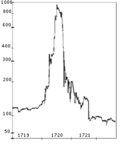Portal:Business
The Business and Economics Portal  Business is the practice of making one's living or making money by producing or buying and selling products (such as goods and services). It is also "any activity or enterprise entered into for profit." A business entity is not necessarily separate from the owner and the creditors can hold the owner liable for debts the business has acquired. The taxation system for businesses is different from that of the corporates. A business structure does not allow for corporate tax rates. The proprietor is personally taxed on all income from the business. A distinction is made in law and public offices between the term business and a company (such as a corporation or cooperative). Colloquially, the terms are used interchangeably. (Full article...) Economics (/ˌɛkəˈnɒmɪks, ˌiːkə-/) is a social science that studies the production, distribution, and consumption of goods and services. Economics focuses on the behaviour and interactions of economic agents and how economies work. Microeconomics analyses what is viewed as basic elements within economies, including individual agents and markets, their interactions, and the outcomes of interactions. Individual agents may include, for example, households, firms, buyers, and sellers. Macroeconomics analyses economies as systems where production, distribution, consumption, savings, and investment expenditure interact; and the factors of production affecting them, such as: labour, capital, land, and enterprise, inflation, economic growth, and public policies that impact these elements. It also seeks to analyse and describe the global economy. (Full article...) Selected articleThe General Theory of Employment, Interest and Money was written by the British economist John Maynard Keynes. Although The General Theory was written in the aftermath of the Great Depression and was taken by many to justify the assumption by government of the responsibility for the achievement and maintenance of full employment, it is for the most part a highly abstract work of theory and by no means a tract on policy. Its full meaning and significance continues to be debated even today. As a book, it is a difficult read for a modern student of economics, although it is enlivened by some brilliant rhetorical passages, including the description of the stock market in Chapter 12 and the concluding chapter 24 on the (rather tentative) policy implications Keynes derived from his theory. Selected image
Selected economyThe economy of the Netherlands is a highly developed market economy focused on trade and logistics, manufacturing, services, innovation and technology and sustainable and renewable energy. It is the world's 18th largest economy by nominal GDP and the 28th largest by purchasing power parity (PPP) and is the fifth largest economy in European Union by nominal GDP. It has the world's 11th highest per capita GDP (nominal) and the 13th highest per capita GDP (PPP) as of 2023 making it one of the highest earning nations in the world. Many of the world's largest tech companies are based in its capital Amsterdam or have established their European headquarters in the city, such as IBM, Microsoft, Google, Oracle, Cisco, Uber and Netflix. Its second largest city Rotterdam is a major trade, logistics and economic center of the world and is Europe's largest seaport. Netherlands is ranked fifth on global innovation index and fourth on the Global Competitiveness Report. Among OECD nations, Netherlands has a highly efficient and strong social security system; social expenditure stood at roughly 25.3% of GDP. The Netherlands has a prosperous and open economy, which depends heavily on foreign trade. The economy is noted for stable industrial relations, fairly low unemployment and inflation, a sizable current account surplus (which, compared to the size of the country, is even more than Germany) and an important role as a European transportation hub; Rotterdam is the biggest port in Europe; and Amsterdam has one of the biggest airports in the world. Industrial activity is predominantly in food processing, chemicals, petroleum refining, high-tech, financial services, the creative sector and electrical machinery. Its highly mechanized agricultural sector employs no more than 2% of the labor force but provides large surpluses for the food-processing industry and for exports. The Netherlands, along with 11 of its EU partners, began circulating the euro currency on 1 January 2002. (Full article...) Selected quote"Gresham's law has made a modified reappearance. For most cars traded will be the "lemon", and good cars may not be traded at all. The"bad" cars tend to drive out the good (in much the same way that bad money drives out the good). But the analogy with Gresham's law is not quite complete: bad cars drive out the good because they sell at the same price as good can; similarly, bad money drives out good because the exchange rate is even. But the bad cars sell at the same price as good cars since it is impossible for a buyer to tell the difference between a good and a bad car; only the seller knows. In Gresham's law, however, presumably both buyer and seller can tell the difference between good and bad money. So the analogy is instructive, but not complete."
TopicsRelated WikiProjectsDid you know (auto-generated) -
On this day in business history
General imagesThe following are images from various business-related articles on Wikipedia. More did you know
Business news
SubcategoriesRelated portalsThings you can doUrgent and important articles are bold WikimediaThe following Wikimedia Foundation sister projects provide more on this subject:
SourcesDiscover Wikipedia using portals |








































